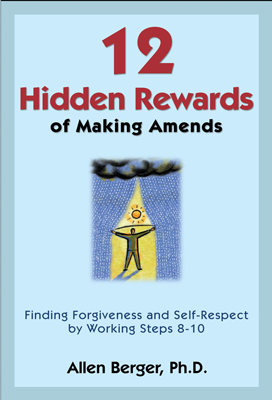The 12 Gifts from Working the Steps
An excerpt from
An Abridged Version of 12 Hidden Rewards of Making Amends
by Allen Berger, PhD., Hazelden Publishing
PART FIVE | Authenticity, Compassion, Responsibility and Trustworthiness: Hallmark Hidden Rewards of Making Amends
There are many hidden benefits, or rewards, from our efforts to adhere to right principles and healthier living.
Step 10 asks us to continue staying close to our experience and learning from it.
By stepping up, owning who we really are, and taking responsibility for our actions, we continue the reconstruction of a more positive self-concept. Authenticity is central to our growth and development. It is essential to our recovery and to our maturity.
Authenticity creates presence. It allows us to live in the moment, right here, right now. When we are present, we are fully experiencing ourselves, our thoughts, our feelings, and the other person.
Authenticity is an incredible gift and reward for having the courage to face ourselves as we are, warts and all. It also helps us connect to a deep compassion for our own suffering, for the suffering we have caused others, and for those who are still suffering.
A spirit of compassion evolves from the process of making amends and from a practice of self-examination. Being compassionate is a natural outcome of this process. By making a list of all the people we have harmed and discovering the pattern underlying our hurtful behavior, we can see that we were the common denominator in all our difficulties.

Taking responsibility for who we have been, what we have done wrong, and who we want to be is self-empowering. We cannot make sincere amends unless we are compassionate. The meaning of the word compassion demonstrates its importance in this process. It is derived from the Latin word com, which is a prefix that means “together,” and pati, a suffix that means “to suffer.” Compassion, therefore, is sorrow for the sufferings or trouble of someone, accompanied by the urge to help. When we make amends, we engender compassion for ourselves and others.
Seeking to right our wrongs and take responsibility for what we have done wrong also releases us from our need to be right. We can end conflict with our fellows. We can stop trying to convince others that we are right and they are wrong.
We make amends to take responsibility for our side of the street because it’s the right thing to do, and we do it to forgive ourselves rather than to seek or receive forgiveness. We stop living up to other people’s expectations and become more concerned with what we expect from ourselves.
One of the hidden rewards of working these three Steps is that our focus on outcomes diminishes. It is a paradox. When we shift our focus from outcomes to the challenges and joys of being (of process), we can use our awareness to realize our potential.
Being a process of potentialities being born is exciting, because it is the process of uncovering and discovering who we really are. This reunites us with our true-self, with our basic need to grow, and restores our ability to self-actualize. We recover our motivation to grow, which was hijacked by our false-self and our addict-self.
One of the hidden rewards from working Steps 8, 9, and 10 is the restoration of trust. We restore the trust we have shattered by becoming trustworthy. Being worthy of trust is critical if we are going to develop healthy human relations.
Being trustworthy is sacred. It requires that we operate from the best in us, not the worst in us. This is a very important hidden reward from working Steps 8, 9, and 10. We restore trust in our relationships because we are worthy of being trusted. This does not mean that we become perfect and therefore won’t ever do wrong again. We strive for progress, not perfection. But if we commit ourselves to accurate self-appraisal, we will recognize when we are wrong and clean it up.


[…] PART ONE PART THREE PART FOUR PART FIVE […]
[…] PART ONE PART TWO PART FOUR PART FIVE […]
Dear Dr. Berger,
I just want to say thank you for your work. I am enjoying learning about Emotional Sobriety. Praying for the best for you and your family, Cathy McL. cmclelland@comcast.net